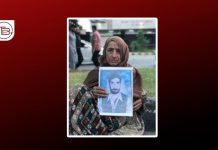The International Commission of Jurists regretted that Pakistan’s Commission of Inquiry on Enforced Disappearances (COIED) had failed to deliver justice to the victims and to address the issue of entrenched impunity, leaving the victims and their family members without redress.
In a briefing paper released on Tuesday, International Commission of Jurists, a Geneva-based non-governmental human rights organization, titled “Entrenching Impunity, Denying Redress: The Commission of Inquiry on Enforced Disappearances in Pakistan” regretted that the government body had documented a number of enforced disappearances, but failed to take a pragmatic approach to end the heinous crime and deliver justice to the families of the victims.
Commission on Inquiry of Enforced Disappearances (COIED) was established in 2011 by the Pakistani federal government to track the whereabouts of the victims of enforced disappearances and trace the organizations or individuals responsible for these disappearances.
The ICJ briefing paper provided an assessment of the performance of COIED in addressing the issue of enforced disappearances and evaluated the legal framework that the Commission operates under in the light of international law and standards.
According to the paper, enforced disappearances have been reported since the 1970s, but gained momentum with Pakistan’s involvement in the US-led “war on terror” in the early 2000s. The paper claims that enforced disappearances have been used as a tool against political activists and people who are ‘suspected’ of being sympathetic to the nationalist movements in Balochistan, Sindh and Khyber Pakhtunkhwa. Academics, journalists and bloggers have also been the victims of “short-term enforced disappearances”, where they have been apparently interrogated secretly for weeks or months, and then released in a battered condition, without being charged with any offence.
The paper says that the government body received 23 new cases of enforced disappearances in August 2020, bringing the total confirmed cases from 2011 to 6752. 4642 cases out of these 6752 have been “disposed of”, whereas the 2110 cases are still pending. The cases categorized as “disposed of” are vastly malleable. These cases have been closed when 1) the victims have been “traced” in jails, internment centres or their homes, 2) when they have been found dead, 3) when the plaintiffs provided an “incomplete address” of the victims, 4) when the complainants withdrew the complaints, and 5) or when the cases were not prosecuted.
According to the Commission’s monthly reports, more than 800 cases of enforced disappearance were traced to internment centres or other detention facilities in the country. A significant number of missing persons were eventually traced in internment centres years after their families had registered complaints against their disappearance, long before the introduction of the COIED. The paper says that a period of unacknowledged detention remains an enforced disappearance – a crime under the international law – irrespective of whether the fate or the whereabouts of the missing person are clarified.
ICJ says that the commission failed to “fix responsibility” of these enforced disappearances on any organization or individual, or registered First Information Reports against them, for concealing the whereabouts of the missing persons who were eventually traced in the detention facilities.
The Commission’s ambiguous standard for “enforced disappearances”, instead of redressing the problem, further exacerbated it. According to the reports, at least 213 dead bodies of missing persons were found. Since these people were no longer alive, they couldn’t be ‘missing.’ Hence, these cases were categorized as “disposed of.” The Commission also clarified that the Police or the law enforcement agencies had killed a number of these people in “encounters.” If so, why was the Commission remained silent on why the admission of “encounter” was made months or years after the registration of these people as “missing persons”? And what steps had been recommended or taken to fix responsibility on the perpetrators, the paper questions.
The paper claims that the legal framework for the appointment and functioning of COIED do not meet the international standards for effective communication, and thus do not satisfy the duty incumbent on Pakistan to guarantee human rights to the victims of enforced disappearances. The Commission has documented a significant number of cases of enforced disappearances and even clarified the fate or whereabouts of the missing persons, but has failed to deliver justice to the victims’ families or to hold the perpetrators accountable.
According to the paper, even the Commission’s definition of “enforced disappearance” is deeply problematic, which defines it as: “Enforced Disappearance/ Missing Person means such person as has been picked up/taken into custody by one of the law enforcement/intelligence agencies, working under the civilian or military control, in a manner which is contrary to the provision of Law.” This definition does not comport with the definition of enforced disappearance under international law. The corresponding definition by the International Convention for the Protection of All Persons from Enforced Disappearance, the instrument of the United Nations intended to prevent enforced disappearances, is: “The arrest, detention, abduction or any other form of deprivation of liberty by agents of the State or by persons or groups of persons acting with the authorization, support or acquiescence of the State, followed by a refusal to acknowledge the deprivation of liberty or by concealment of the fate or whereabouts of the disappeared person, which place such a person outside the protection of the law.”’
The Commission’s definition is restricted in many ways: it fails to include secret detentions; it does not recognize the deprivation of liberty as an ‘enforced disappearance’, which is explicitly enshrined in the ICPPED definition; it does not recognize that state actors do not necessarily have to carry out an arrest or abduction, it can be done by non-state actors which work under the authorization, support or acquiescence of the state. This incomplete and problematic definition gives a lot of freedom to malicious actors to carry out enforced disappearances and remain out of the grasp of the law.
The paper claims that the controversial military courts have also contributed to further perpetuating enforced disappearances. Pakistan empowered these courts to try civilians accused of terrorism-related offences in 2015. These courts have convicted hundreds of persons in terrorism charges in the past five years. The Peshawar High Court overruled a considerable number of such convictions twice – once in 2017 and recently in 2020 – for lack of firm and reliable evidence against the convicts.
A significant number of people convicted of terrorism-related wrongdoings were reportedly the victims of enforced disappearances which were produced before the court after years of unjustified detention. The laws empowering the military courts had a retrospective effect, and, therefore, all the detentions by the security forces made before the formation of these courts have been made “legal” under the military’s new judicial powers. These courts have reportedly extracted forced confessions out of the victims and then used to persecute them. The detainees have also been denied of the right to choose a lawyer of their choice and barred from contacting family members. In many cases, the family members said that they were unaware of the condition of the victims until their so-called incrimination by the military courts.
The paper further argues that in scant cases when the Commission has directed the registration of FIRs against the perpetrators, its regulations have remained silent. While the Commission has the mandate to incriminate the culprits of enforced disappearances, Pakistan’s criminal laws do not recognize enforced disappearance as a distinct crime. They undermine the gravity of the legal consequences of the crime, leaving the perpetrators immune to the law.
The Commission, which according to the UN Impunity Principles must remain impartial, competent and independent, is under the ministry of interior, which means it is functionally and structurally subordinated to the ministry. This is particularly problematic: the ministry of interior has oversight authority over law enforcement agencies, which are often involved in the enforced disappearances. This subordination explains why the Commission has limited authority over the law enforcement agencies.
The briefing paper concludes that the existence of the Commission on Inquiry of Enforced Disappearances has been used by the “Pakistani Government to purport to be upholding notions of accountability and to demonstrate the political will to address the issue of enforced disappearance.” There is a “climate of impunity” in Pakistan regarding enforced disappearances, the paper says.
According to the ICJ, this impunity has persisted in Pakistan for a long time and played a paramount role in the enforced disappearance, and is only growing, not only in its geographical outreach but also in the categories of people it targets. The paper alleges that COIED and other such government bodies are ostensibly formed to provide a measure of public accountability, they have repeatedly diverted reporting and investigation from human rights violations in Pakistan.
The International Commission of Jurists also made many recommendations to the Pakistani government in the report, like holding participative consultation with the victims of the enforced disappearances, establishing enforced disappearance as a specific public offence, and to ensure the punishment is commensurate with the gravity of the crime. To prevent enforced disappearances in future, the paper recommended that Pakistan must formulate clear rules dedicated to the institutions to ensure oversight and accountability of the law enforcement agencies, prohibit any form of secret, incommunicado detention, and give appropriate training to the security forces regarding the human rights.






























